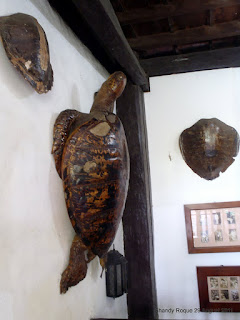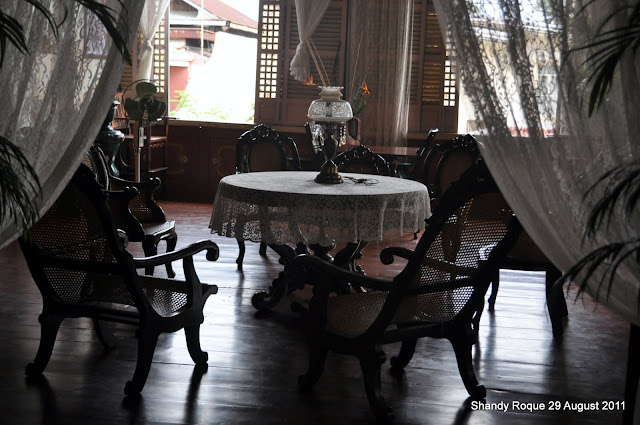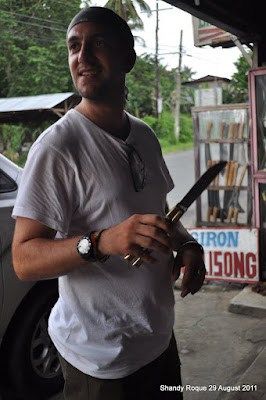 |
| Villa Tortuga |
After going through a three-hour bus ride from Manila, we were picked up at the Taal Basilica and taken to the beautifully restored colonial house, Villa Tortuga. Being an antique collector, our host has filled the house with the pieces that he has collected over the years. At the entrance, you'll spot a huge preserved turtle as well as several turtle shells decorating the wall, making the meaning of the house's name more obvious. Tortuga, after all, is turtle in Spanish.
 |
| The Bedroom. A wardrobe and chair that are beautifully positioned with the portraits on the wall. |
 |
| The Bed. The room has four beds. One of them is a four-poster bed. |
 |
| The Dining Room. |
 |
| Dollie. You'll spot a doll seated on a chair on your way to the dining room. |
 |
| The Foyer. |
 |
| Portraits. The walls are filled with portraits instead of paintings, giving the house more character. |
 |
| Really Old Books. |
After we've finished taking our things to the room and taking a breather from our trip, Lito took us on a tour, beginning with the Basilica de San Martin de Tours which is also known as the Taal Basilica. I'm really not a church-goer but I was fascinated by the grandness of the structure that stood before me.
 |
| Basilica de San Martin de Tours. |
 |
| Arches. On the left are bamboo scaffoldings that are being used to restore the altar into its original grandeur. |
 |
| The All-Seeing Eye. The church was built before the Masonry was formed so the symbol in the altar was actually deemed as an old representation of God who sees everything. |
After being toured around the cathedral, we headed to a spot where people collect healing water from a spring.
 |
| An Old Arch. This marks the entrance to the spring. |
Our next stop was the Lady Casaysay Church where the revered figurine has the tendency to mysteriously disappear. In the church, you will find a painting that depicts the figurine's mysterious origin.
 |
| Our Lady of Casaysay Church. |
Since we visited Taal during the long weekend, we couldn't see some of the places in the itinerary as they were closed. The Agoncillo House, which used to be the home of the lady who made the first Philippine flag, was closed because it is a government-owned museum where all national holidays are observed (which is sad because this is the time when people can actually visit the place). One of the two houses of the Marella and Villavicencio families was also unavailable because the family was home for the long weekend. This left us with a lot of time to head to San Nicholas where we saw the ruins of the first Basilica de Martin de Tours and the Taal Volcano.
 |
| Taal Volcano. This relatively small volcano erupted for two hundred days in the 16th century, destroying the cities around it. |
Galleria Taal
The next place that we visited was the Galleria Taal which has a collection of rare cameras dating late 1800's to late 1900's. It also has displays of early Philippine photography in the Spanish and American eras, including the picture of Jose Rizal's execution. By looking at the images on the wall, you would be quite amazed by the changes that the city has gone through throughout the century. There was even a point in time when Manila can be compared to Paris because of its beauty and modern infrastructure. This was, of course, before World War II. Unfortunately, after everything was destroyed by bombs, the city wasn't restored to its former glory.
The next place that we visited was the Galleria Taal which has a collection of rare cameras dating late 1800's to late 1900's. It also has displays of early Philippine photography in the Spanish and American eras, including the picture of Jose Rizal's execution. By looking at the images on the wall, you would be quite amazed by the changes that the city has gone through throughout the century. There was even a point in time when Manila can be compared to Paris because of its beauty and modern infrastructure. This was, of course, before World War II. Unfortunately, after everything was destroyed by bombs, the city wasn't restored to its former glory.
Villavicencio's Wedding House
Our next stop was the Villavicencio's wedding house. This was the wedding present of Eulalio Villavicencio to his wife, Gliceria Marella. Not only is it worth visiting because of its impressive design, fans of Nora Aunor's new series may want to flock to this residence when they find out that her new series is being filmed here.
On the way home, we dropped by a shop where butterfly knives are being sold. Batangas is well-known for making these knives which are known to Filipinos as balisong.
Back in Villa Tortuga, we chilled for a bit. Around eight o'clock, we were asked to head to the studio to change into our costumes. And, we were asked to pose in front of a very realistic background for the free sepia prints that come with the package. After that, we had more pictures taken around the house before we had dinner.
Dinner was amazing! We had a taste of Batangas cuisine. Roggi Reyes, our other host, took care of describing each dish that was served on our table. And, the staff made sure that our glasses were always full.
 |
| Chicken broth with Malunggay Leaves. I think the small leaves in this soup are only served in the Philippines as I haven't seen them in other Asian countries. |
 |
| Pork with Pineapples. |
 |
| Tapa. |
 |
| Tawilis. A type of fish which is found in Taal Lake. |
 |
| Tomatoes Stuffed With Tawilis. |
 |
| Fudge topped with vanilla ice cream and peanut brittle with a small cup of chocolate on the side. |
After being served a wonderful meal, we changed out of our costumes and had a chat with our hosts before we retired for the night. The next day, before we left for our trip to Talisay, they served us a scrumptious breakfast and took us to the market where I got to buy some chocolate and some dining accessories made of pina cloth.
 |
| Torta. The Filipino version of omelette. |
 |
| Longanisa. This is the Philippines' version of sausages. These sausages vary depending on the region making them. The sausages from Batangas have a balanced blend of sweetness and saltiness. |
If you're looking for something different or a romantic getaway, this is a really nice place to go for the weekend. Our hosts were very accommodating and warm. And, you can see their passion in restoring beautiful historical sites into their former glory. They also put a lot of effort in showcasing the products produced by the people in the region.
Quick Travel Notes:
Villa Tortuga
Lito Perez. 0917-8246900.
Galleria Taal
Manny Inumerable. Proprietor. +639189124051
Dolores Bautista. Museum Caretaker. +639067632449
Damage:
The price was around Php1,500 (around $30) per person for the day trip which includes lunch and Php2,000 (around $40) per person if you plan on staying there for the night. The package includes dinner and breakfast. The tickets or entrance fees for the ancestral houses are not included in the package. They range from Php20 to 50 (around 50 cents to a dollar).
Transportation:
Take a Jam Bus to Taal. Tell the driver where you're going so he could tell you where you're supposed to get off. You can get a jeep to the Basilica from the gas station where you will be dropped off.
Shopping
Drop by the handicraft shop opposite the market. They sell really nice things that would be more expensive in city malls.
Drop by the handicraft shop opposite the market. They sell really nice things that would be more expensive in city malls.





















This comment has been removed by a blog administrator.
ReplyDelete